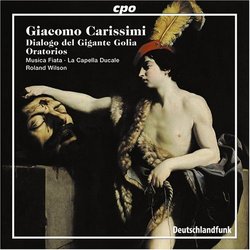| All Artists: Giacomo Carissimi, Roland Wilson, Musica Fiata Köln, Musica Ficta, Constanze Backes, Monika Mauch, Wilfried Jochens Title: Giacomo Carissimi: Dialogo del Gigante Golia Oratorios Members Wishing: 0 Total Copies: 0 Label: Cpo Records Release Date: 4/19/2005 Genres: Pop, Classical Styles: Vocal Pop, Opera & Classical Vocal, Historical Periods, Baroque (c.1600-1750) Number of Discs: 1 SwapaCD Credits: 1 UPC: 761203998326 |
Search - Giacomo Carissimi, Roland Wilson, Musica Fiata Köln :: Giacomo Carissimi: Dialogo del Gigante Golia Oratorios
 | Giacomo Carissimi, Roland Wilson, Musica Fiata Köln Giacomo Carissimi: Dialogo del Gigante Golia Oratorios Genres: Pop, Classical |
Larger Image |
CD Details |
CD ReviewsThe Giant is Carissimi, Not Goliath! Giordano Bruno | Wherever I am, I am. | 12/05/2007 (5 out of 5 stars) "What do Alessandro Scarlatti, Heinrich Schuetz, Giacomo Carissimi and other 17th Century oratorio composer have in common with Snoop Dogg, 50 Cent, and other rappers? Answer: A fervent commitment to words. A devotion to expressing language in music without subordinating either one to the other. For me, I have to confess that the Baroque dudes get it done better. I can understand the Italian of Scarlatti, the German of Schuetz, and even the Latin of Carissimi a good deal easier than the English of most rappers. But then I'm familiar with the Biblical source texts.
Recitativo - recitation - was perhaps the greatest innovation of the Italian opera composers of the generation of Monteverdi. Though resisted by many for conservative musical and theological reasons, recitativo quickly established itself as a vehicle for 'sacred' texts also, in the form of Schuetz's Histories and Passions, Scarlatti's Operas at the Altar, and Carissimi's Oratorios. Oratorio, oration - the root word is Latin for prayer. The four oratorios by Carissimi on this CD are primarily recitativo, sometimes 'dry', sometimes instrumentally decorated, sometimes 'cantilena', almost song-like. There are arias interspersed but they are mostly brief. The soul of this music is the expression of the text in all its eloquence. Regina Hester is the Old Testament story of Ester, the Jewish queen of Persia. The confrontation of David and Goliath forms the second pice, Il Dialogo del Gigante Golia. De Tempore Interfecto Sisare is the tale of the slaying of Sisera by Deborah, also Biblical, and the final text, Diluvium Universale, is the story of Noah's Flood. A listener like me, with a modicum of Latin and a lot of Sunday School, should be able to grasp much of the action from the music, but I chose to follow the text in translation in the CD booklet, and it gave me more pleasure to experience complete comprehension. Though you won't be able to hum any tunes from Carissimi after listening to these four oratorios, their musical impact is immense. Every detail of language is matched with a dramatic flourish of tone, a perfect partnership of word and sound. The principal singer/reciters, Monika Mauch, Constanzes Backes, Harry van der Kamp, and Wilfried Jochens all have superbly expressive voices and technique. They are joined at times by a small choir of other voices and by a chamber orchestra of two violins, two cornetti, trombone, and continuo. The director of Musica Fiata, Roland Wilson, is himself a fine cornettist. There are flashes of instrumental color, yet the 'band' never gets out of hand. They too understand that the text is primary. I remember the first recording I ever heard of Carissimi (his oratorio Jephthe) in about 1965. It was hideous. It sounded like Handel wrung dry of melody. Since that pioneering musical sacrifice, a lot has been relearned about how to sing and play early Baroque music. In terms of historically informed performance, this CD is 'state of the art'. How do I know, you may ask, that THIS is what a 17th C oratorio should sound like? Of course, I can't claim to know absolutely, but my ears tell THIS is MUSIC! This is not just a musicologist's curio; this is something splendid to hear. I can't guarantee that everyone will take to it immediately, but if you've learned to enjoy Bach's cantatas or Monteverdi's operas, you're ready for Giacomo Carissimi." |
